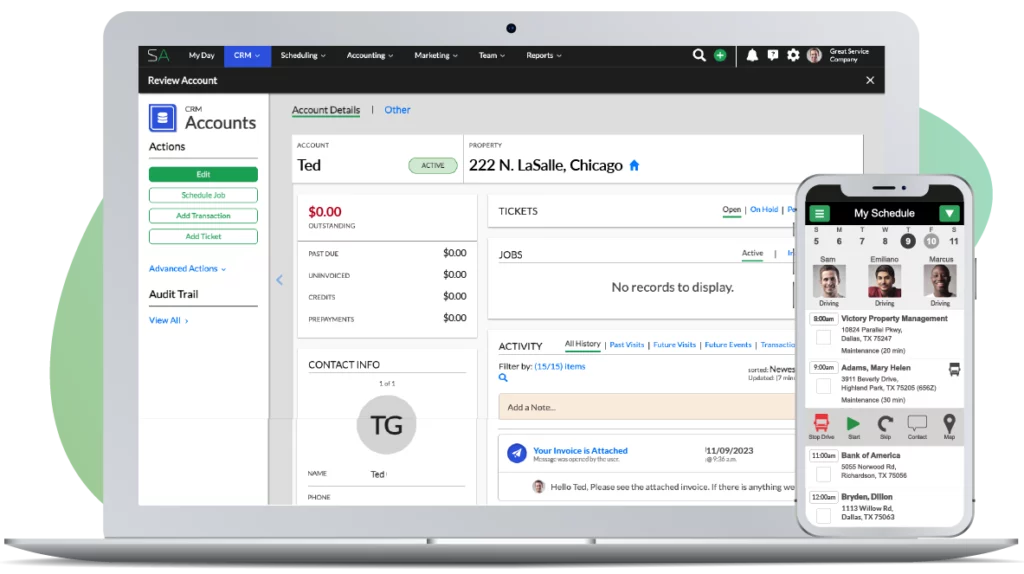This question is from Cody Allen, and he is asking about acquiring accounts and purchasing used equipment. The question is in the past, he first says that he has acquired some accounts, a small number, but now he’s interested in taking over a buddy’s company and he wants me to pay for the accounts. I figured this is standard in the business. Also, what percentage of the yearly income from the accounts should I pay for them? Is there a general rule of thumb in regard to what one should pay for the contracts? Also, do you think it’s worth buying the used equipment when I just bought brand-new equipment the first year I started?
The way to think about this is that when buying accounts, especially residential, commercial is a little different, but especially residential, what are you really buying here? You’re buying exactly what you said. You’re buying accounts. When you’re buying accounts, you’re saying that I’m just buying the value of the account, the work for however long I continue to be able to service that work, but you’re not buying a business. You’re not buying employees. You’re not buying processes and procedures or management team. You’re not buying anything other than the value of the accounts.
If you’re an insurance agent and you go out and you sell lots of insurance policies and you build a book of business, you sell your book of business for some amount of money; and the guy that acquires that book of business doesn’t really have to do much generally, and that’s probably not a fair statement. You don’t have to do that much to service that book of business. If he sold a life insurance policy, and on average a typical person keeps her life insurance policy for five years. I’m making all this up. He doesn’t really have to do a lot of work during that five years. He continues to get a check for that book of business.
It’s a little different for you when you buy an account in that if you don’t show up next week to mow the lawn, you lost the account. Every week, now that you’ve bought the account, every week from this point forward, you’ve got to do something. You didn’t the employees and the systems to do those things. You’ve got to handle all of that. Also, you’ve got to constantly interact with those clients. If those clients made their buying decision and they chose the person you’re buying the accounts from and they like that person and they chose him for some reason or they like the way he did his invoicing and you invoice differently, there was something they chose, some reason they chose him. They didn’t choose you. So as soon as you buy the accounts, you weren’t their choice; they might as well look around.
Going into any scenario when you buy accounts because you’re not taking over the whole business and the homeowners or the commercial business owner doesn’t really completely … in some situations when you’re buying a big business, they don’t really know that you just acquired the company. Nothing really changes. When you’re buying accounts, everything is transferred to you. You now talk to them. It’s your people showing up at their lawn, at their home.
Going into a situation like this, you need to fully expect to completely resell the customer. You’ll probably find in a lot of accounts, you need to raise some prices. You don’t like the way they were paying. They were paying every 30 days. You want to get paid more often. There’s going to be stuff that you need to change in time, and there’s going to be reasons why you have to resell this client. You want to retain them and keep them. You just paid for the account.
In my opinion, when you acquire accounts, you still do a lot of the same work you do as when you go out and sell the accounts yourself through marketing. For that reason, I do not like to pay much for an account that I’m acquiring than what I can go get it myself for.
If you’re acquiring all the crews and employees to go with it, that helps a little bit because now you don’t have to go find all the employees. Again, you’re assuming that those people are good and that the pricing is good. If somebody is getting out of the business, generally it’s because they don’t like the business, and it’s generally because something is wrong with their business. They have this great business with great accounts that pay great money. You usually don’t want out. You’ve got to assume when you’re acquiring accounts versus a real company that there’s some flaw, and therefore you can’t overpay, and you’re going to have to do all the same work and labor as getting these accounts yourself. Again, you can’t overpay.
That’s my attitude on acquiring accounts. I’m not saying don’t do it. I think you can do it successfully. Just be aware of what really goes into doing it, and know that you’re going to have a lot of work to do to keep these accounts and make this a successful transaction. You also have a lot of risk. If everybody leaves, you just wasted a lot of money, so how can you negotiate the deal where you basically pay on retention? These are things to think about.
But it’s a strong strategy, and there are big, big companies that acquire companies just because they need to acquire companies to grow fast. They can’t just grow organically through their own sales and marketing efforts fast enough, so they go out and acquire businesses and acquire accounts. There’s a real strategy around this, but it takes a lot of work, and there are people who are dedicated to making acquisitions just as even on a small scale you have to be dedicated to doing all the work to get the accounts up and running in your business and then keep them and convince those homeowners or commercial property owners that you are their very best solution and resell them.
If you can do all of that and you’re prepared to do it and you can get the right price for the accounts, then I would say buy the accounts. A rule of thumb is if you can go out and get your own accounts for about $200 per account based on your marketing expense, then I wouldn’t want to pay too much more than $200 an account. That’s my rule of thumb. Everybody has a different number.
When you go out and you sell a company that’s a real company, a lot of times you can get about five times cash flow. Let’s just call it four to five, maybe six if you’re a great company, times cash flow. Don’t hold me to that, but you can get those types of numbers, cash flow. To keep it simple, let’s just call it profit. If you have a million-dollar company, you make $100,000 a year and profit out that business, that business might be worth somewhere between $400,000 and $600,000. Again, don’t hold me to that. That’s just a rule of thumb and it varies all over the country. It depends on when you’re selling the business and if it’s desirable. It depends on how good the business is. There are a million factors.
That is for a real business with a team of people that can hopefully run without you as the owner, at least to some degree. It’s not just for a block of accounts. I wouldn’t pay anywhere even in the realm of that kind of number for a company that you’re acquiring accounts. If they’ve said I make $30,000 a year in profit off this, I’d like $70,000. It doesn’t interest me at all, generally not. I don’t know much about this deal. Just be careful. Think about it from that standpoint.
I think the easiest way to think about it is this is not a real business you’re buying, so what is the cost for you to just go get these accounts yourself, because you’re going to do all the same amount of work? That will sort of give you your answer.
I hope I didn’t scare you off from this because if you can make the deal work, this is a nice way to go. One last thing: be very careful that you analyze the pricing. I don’t know what kind of business this is, but maybe they price the mowing correctly but then they under-price fertilization, weed control, bush trimming, so you might evaluate the mowing price to say, oh, this is a good business, but then you’re going to get burned and lose money on the other stuff, or the profits from the lawn mowing are going to be sucked out of the business because you’re losing money on lawn care and bush trimming.
You have to analyze all the pricing across the board before you acquire these accounts. Good luck.



